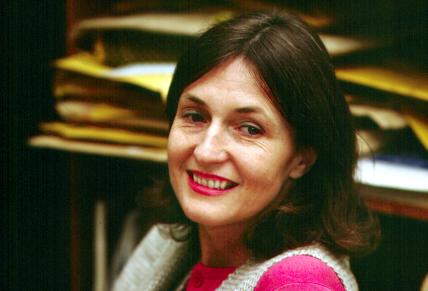

|
|||||
|
|
|
|
|
|
|
| Directed by Terre Nash |
| Canada, 1982 (documentary, 26 minutes, colour / black and white, English) |
| Also known as "Si cette planète vous tient à coeur" |

|
| Image: © National Film Board of Canada |
|
Video (National Film Board of Canada)
Video (National Film Board of Canada) [French] |
|
Film Description: "This film records a lecture given to students by outspoken nuclear critic, Dr. Helen Caldicott, president of Physicians for Social Responsibility in the United States. Her message is clear: disarmament cannot be postponed. Archival film footage of the bombing of Hiroshima and images of its survivors seven months after the attack heighten the urgency of her message: namely, that unless we shake off our indifference and work to prevent nuclear war, we stand a slim chance of surviving the 20th century." -- National Film Board of Canada (source) |
| Film Credits (partial): | |
| Produced by: | Edward Le Lorrain, Kathleen Shannon |
| Film Editing: | Terre Nash |
| Music: | Karl Duplessis |
| Production Company: | National Film Board of Canada / Office national du film du Canada |
"When Terri Nash first proposed the idea, there was only a modest hope
that the NFB would agree to produce it. The subject—one passionate (and
rather shrill) lecturer on a familiar topic—wasn't the sort of thing that
usually appeals to filmmakers. Before putting the idea to the people in
NFB's Studio D (the women's unit), Nash went to Washington and spent
five days in the national archives, searching for film that was in the public
domain and could be obtained at little cost. 'It was my first film,' she said
recently, 'and I was trying to get material that would be really cheap, so
that I could present them with a proposal that they couldn't turn down."
-- Robert Fulford
(source)
"Combined, the Oscar and the Justice Department's reaction encouraged Prime Minister Trudeau to order a video-cassette of the 28-minute 'hot potato' produced by the nation's film agency [If You Love This Planet]. Shortly after, he invited Helen Caldicott to lunch and then to a Liberal policy session. Commenting on Trudeau's subsequent peace mission in the autumn of 1983, a senior government official told journalists that Trudeau mentioned Caldicott more than any other person he had talked to on the subject."
-- Chris Sherbarth
(source)
"The NFB Programme Committee of the time [...] criticized
the idea as uncinematic—it was just an illustrated
speech, said most of our male colleagues. Besides, they
added, [Helen] Caldicott was, well, shrill. Strident. Hysterical.
Once Planet was made but before it was released, distribution
officials at the NFB said we should remove the clips featuring Ronald
Reagan as a bomber pilot in old war movies; they would offend
the U.S., and besides, were a 'cheap joke.' What they
failed to understand was that women weren't laughing at the
correlation between nuclear madness, machismo, and media. We
resisted this internal self-censorship. Planet has become one of
the most-used films in Canadian history."
-- Bonnie Sherr Klein
(source)
"[If You Love This Planet] is devastating in its simplicity. Renowned peace activist Dr. Helen Caldicott delivers a lecture about precisely what a nuclear war would mean in terms of human casualties. [Terre] Nash then cuts from shots of the eloquent Caldicott to horrifying black-and-white footage of the atomic bombings of Hiroshima and Nagasaki"
-- Wyndham Wise
(source)
|
|
|
|
|
|
|